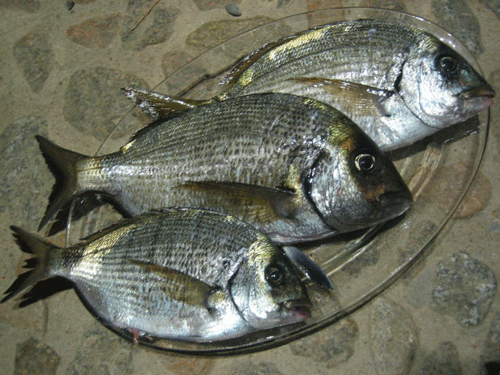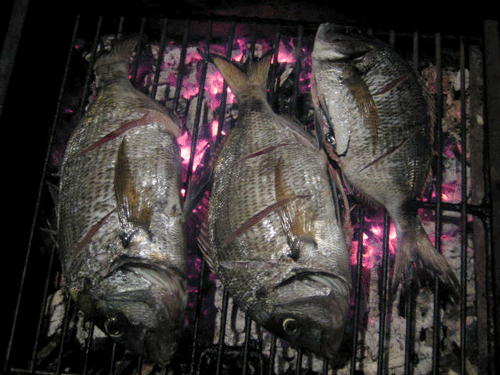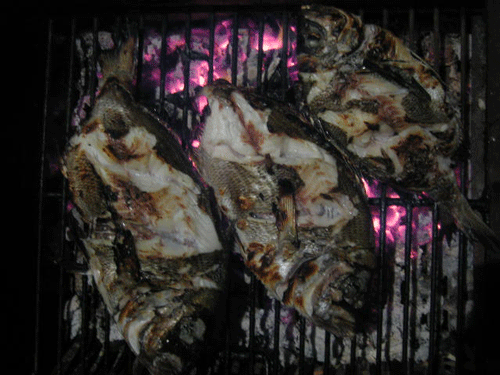September 14, 2006
Snorkel Report

Last week was crowning achievement in the snorkel life here in Tossa: three night dives once every other night, three nights hunting for dinner. I shopped for tridents at the local dive shops but all I could find were flimsy plastic and steel tips and not the Posiden?-grade weapon that we really needed. The one saving grace is that they are cheap and therefore disposable. After breaking off a tip when pinning fish against the rocks, theoretically we can replace them in the water... a good theory yet to be tested. We scrounged around for broom sticks in Kiko's washroom and I felt a little Tom Sawyer-like, homespun and improvisational.
The moon was full all week and getting bigger with each dive. The downside is that -according to Kiko- the fish are not as sleepy with the bright moonlight suffusing the scene. The upside is that the underwater landscape is lovely, entrancing. The view reminds me of nighttime scenes in snow country, the light reflected up from the snowy ground, perhaps the sight owls have in a pitch black night. At sea, the sandy bottom resembles snow and the rocky outcroppings are dark silhouetted outlines between. With the flashlights switched off, you can see all of this but little detail and no sea creatures, only shadows. You can see the moon from deep below the sea. I get the sense that dives go deeper at night than by day. Perhaps this is an illusion, a subjectivity framed by a range of vision limited by the inverse-sqare law of light sources, the flashlight's relatively small cone furtively sweeping space on the way down. At least for me, the first lunges after dinner (fish) rarely hit their mark since the target (fish) wakes up from the light and noise and flits away toward deeper and open water in a blink of an eye. I get the sense too, that night dives go longer per lung full of air since the hunt provides the imperative to persist. Perhaps this too is an illusion, but as I kick deeper in pursuit, juggling the trident and flashlight, pinching my nose to equalize the pressure in my ears, a note of caution blinks faster in my mind: it's time to kick up to the surface, submariner. And there is the moon, shining more clearly than the sun because the sky is dark by contrast I would suppose) and I would rise with the bubbles thinking that the fish must know this moon, its' movements, patterns and quirks. While there is a sense organ laterally along the body of fish to sense signals transmitted in the medium of sea water, it must be a weak sense organ after all, surely it must be by eyesight that they close in on their prey for their own dinner. Therefore moonlight this strong must surely disturb a sea creature's slumber.
The dive team roster: two dives with Kiko and I, and the last episode that included Nacho. Nacho's business is motorcycles. He sells motorcycle accessories and equipment in Barcelona and he manages a racing team that competes under the name of "Attack", the logo of which is a shark image similar to the legendary ace squadron of old, the Flying Tigers. It was therefore no surprise that he sported a "torpedo", a small snub nosed submersible electric powered scooter. Though tiny, it was fast enough to match the strong kicks that I could muster with my Cressi? extra long fins. It was funny to watch Nacho dive deep with his contraption, looking for all the world like an extra in the final undersea fight scene in the '60's movie "Thunderball". Kiko knew all of the crevices and crags along the way, son of Tossa that he is. Being provocative and a bit brash, he tended to disregard the diver's buddy rule as he sped ahead towards his kill zone. Again, I (we) lost sight of Kiko, Nacho and I alone at sea looking for our fellow hunter. In that first time, I was alone and it was pretty spooky swimming back and forth with my light shut off so I could see Kiko's flashlight, just me and the dark sea at the far edge of Cap Tossa. I must not have seen him swim ahead as I was chasing four large fish hidden in a hole in the rocks below. That time, I had swum back and forth four times, stopping to pull off the mask and snorkel to shout Kiko's name into the night., not a god feeling. But was then and since this was my second occasion losing Kiko, I had an idea of where he went. Nacho and I cruised ahead to catch up, Nacho's electric engine whining ahead at full speed, bubbles reflecting the moonlight with small pearls of efflorescence that tumbled and mixed as we disturbed the surface with our swim.
After the disappointing month of August, the experience of swimming through a sea of trash in what amounted to a sewer, I had avoided daytime snorkels. The invasion of jellyfish were bad enough but it was the presence of trash that bummed me out to the point where I kept my gear dry for a while. Snorkeling again in September, I reasoned that the water runoff from the rains had abided and integrated into the sea water... and perhaps it did, perhaps it didn't. I wouldn't have known by night if only by the way our flashlight beams were dispersed by the small particles of matter in the water. I didn't want to know, so disappointing it was. But in the last dive, there was a Sargasso sea of trash and debris floating off the point of Cap Tossa and I felt dread and irritation as trash trailed and scraped along my back, trash bags and who-knows-what catching on my snorkel.
The best part of diving here is in the beginning of summer for sure. I hope that the local authorities get a handle on this situation soon.
When we caught up with Kiko, he had made two kills. He called the fish "Sargo", one about a kilo in weight, another a bit smaller. Looking down, I spotted a target drifting along a cleft in the rocks. Flashlight and trident in my left hand, I kicked down and pinched my nose to even the pressure in my ears. Drifting down in free fall, I shifted the trident to my right hand and with the fish framed in the light beam, I moved the trident tip close to the target and with a lunge, the fish moved but not fast enough as the weapon hit behind the head and below the dorsal fin, the trident smashing against the rock face, breaking one of the tips. I raised the quarry up and swam up, keeping it impaled until I broke the surface where I held the fish aloft not wanting it to wiggle free. After my last dive where I lost two fish after removing them from the trident, I followed Kiko's advice and squeezed the head until I either stunned the creature or killed it. I kept it impaled on the trident and I used both gloved hands to do the grim work. But the creature was too hardy or I was too uncoordinated to do the job. I struggled to get it into the net/bag tied to my waist and as I collected my trident and swam ahead, the fish kept struggling in the bag, the spines of it's fins poking into my legs. This wasn't tolerable. I finally stopped and inserted one of the remaining tips of the trident into a spot behind the eyes, where I suspected the brain was. And the kicking stopped . Three fish, three divers. With Nacho's and Kiko's family waiting by the bar-b-que, we called it a night and cleaned the fish by the shore underneath the south tower of old Tossa.
Fresh fish for dinner, the good life.

Recently, I came across this bit regarding how we moderns tend to forget the connection between the food we eat and the wildlife we appreciate in the media, The Smell of Death":
Armed Liberal wrote about the problem of those who 'keep their hands clean,' never hunting, buying meat prepackaged and without an awareness of the moral cost. I disagree: there is no moral cost. We are monsters, who butcher though it creates mounds of gore: who sever heads, and find it moves us though we know not why.
But it isn't killing that makes us monsters. We are exactly that same kind of creature, whether we have ever killed or not.
The moral problem of 'the clean hands' is that it is an illusion. It makes people believe they are better than they are, and therefore that others can also be better than they can be. It creates a class of people who feel clean, because they have never felt blood on their hands.
Yet all these things arise from things buried deep in the genetic code. You cannot walk away from them. The failure to experience these things does not mean you would not react to them in just the same way as everyone else: it only means that you cannot understand how you would react, and how others do.
The man with clean hands is just the same as the hunter. It is only that he does not know it. He does not understand that part of his soul, as it lurks beyond his experience. He comes to believe that there is a kind of human that is and can be clean: perhaps that sweet, aged lady on the corner, who in her youth broke necks every night before dinner.
Failing to understand what Man really is, he opens himself more than is wise, and defends himself less. The man with the clean hands believes in diplomacy but not the force that makes diplomacy viable. He believes in staying clean, because he believes it makes him better than you. He does not understand that it only makes him blind.
This is not a call to amoralism, but precisely the opposite. It is a call for true morality, which can only begin with awareness of sin. It can only come from a recognition of how deep-set, how permanent, how personal sin is in each of us.
It is only in that way that we can begin to put real chains on sin: by recognizing the truth about it. We must learn to face the truth about ourselves, so that we can better ourselves: we must learn to face the truth about others, so we will recognize when murder is in their hearts.
In Zen Lessons: The Art of Leadership, translated by Thomas Cleary, there is a lesson to which my mind often returns. It is a lesson taught by a great master of early Zen Buddhism, called Chan in the Chinese. He had made a life given to fasting and simplicity, relinquishment and moderation. One day he visited a hermit, preparing a simple meal of rice:
The master said, "Why do crows fly away when they see a man?" The hermit was at a loss; finally he put the same question back to the Chan master. The master said, "Because I still have a murderous heart."So do you. And so do I, and know it. For which cause I set guards on myself, chains of chivalry and courtesy, forgiveness in spite of anger. Our ancestors knew it, for which cause they learned to fight duels instead of wars, and make laws that legitimized violence in defense but not aggression. Armed Liberal is right. Modern society has given many, for the first time, the problem of clean hands. It has yet to teach them how to overcome that problem.

Leave a comment